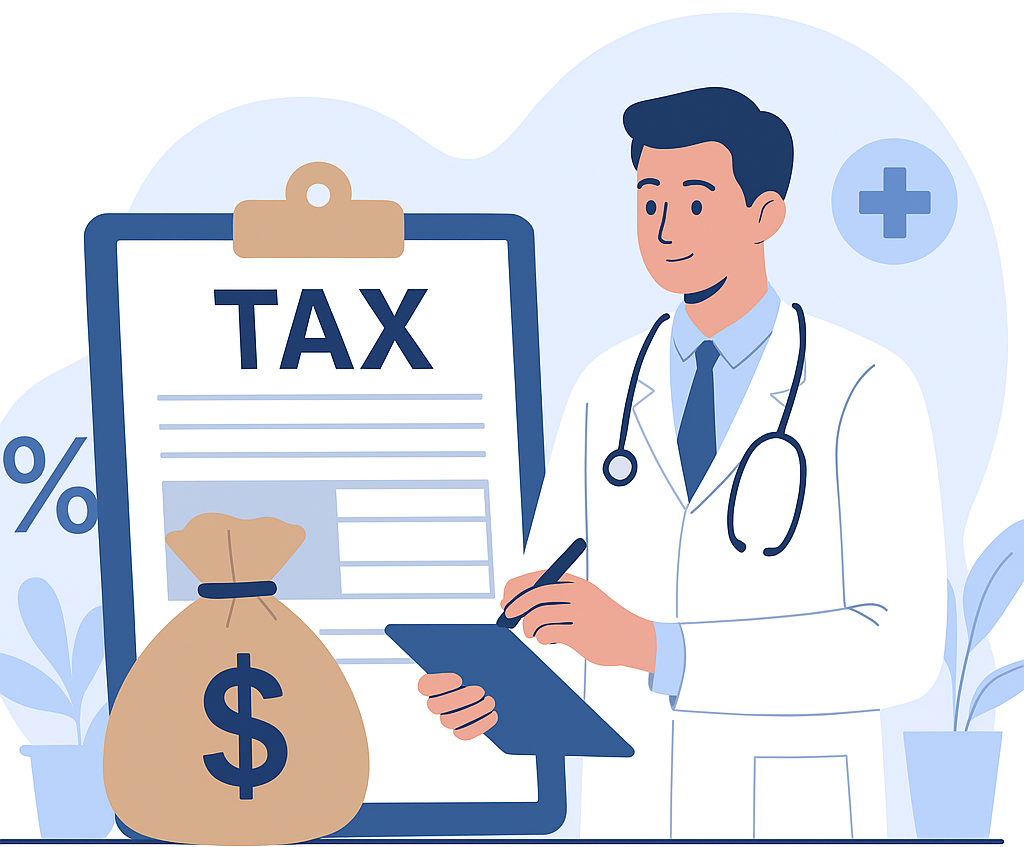Are healthcare premiums tax deductible? This is a question many healthcare providers and small practice owners ask when managing rising costs. The short answer is yes, but it depends on your employment status, filing method, and eligibility. Understanding how deductions work can help you save money, reduce tax liability, and keep more funds available for growing your medical practice.
Table of contents
Who Can Deduct Healthcare Premiums?
Self-Employed Healthcare Providers
If you’re a self-employed healthcare provider, you may qualify to deduct 100% of your health insurance premiums. This deduction can cover you, your spouse, and dependents. The key advantage is that this deduction is made above the line, meaning it reduces your Adjusted Gross Income (AGI). You don’t need to itemize your taxes to claim it, making it more accessible and beneficial.
Important Note: You cannot claim this deduction if you or your spouse are eligible for an employer-sponsored health plan.
Small Practices Offering Group Insurance
For small practices that provide group health insurance to employees, the employer-paid portion of premiums is fully tax-deductible. This lowers your business income and creates additional financial advantages. It’s a double win because it helps you save on taxes and positions your clinic as a more attractive workplace. Offering health coverage is also a strong recruitment tool in a competitive healthcare environment.
Itemized Deductions for Non-Self-Employed Providers
If you’re not self-employed, you can still deduct healthcare premiums through itemized deductions. However, there’s a key limitation, you may only deduct expenses exceeding 7.5% of your AGI. This option can still be valuable if you face high out-of-pocket medical costs. For instance, providers managing chronic conditions or paying significant family healthcare bills may benefit most from itemizing. If you’re not self-employed, you can still deduct premiums if you itemize and your total medical expenses exceed 7.5% of your AGI. This is more limited but still valuable for high out-of-pocket healthcare costs.
What Premiums and Expenses Aren’t Deductible?
Not all healthcare costs qualify for deductions. Some expenses are specifically excluded under IRS rules. Here’s what you cannot deduct:
- Premiums are already paid with pre-tax dollars through an employer plan.
- Cosmetic procedures are performed for non-medical reasons.
- Over-the-counter medicines and supplies, unless prescribed by a physician.
This distinction is crucial for avoiding errors when filing taxes. Submitting ineligible expenses could result in rejected claims or IRS penalties. Always cross-check your expenses with official IRS guidelines before claiming deductions.
Why This Matters for Healthcare Practices
Managing a practice comes with ongoing financial pressure, from payroll to technology. Tax deductions, such as healthcare premium write-offs, provide significant relief. For example, lowering taxable income frees up resources to invest in new diagnostic equipment, staff training, or marketing campaigns. In the long run, these savings support practice growth while ensuring providers’ compliance with tax regulations. Properly managing healthcare expenses strengthens your overall revenue cycle.

Strategies to Maximize Your Deductions
Healthcare providers can take practical steps to ensure they benefit fully from eligible tax deductions:
Maintain Organized Records
Keep detailed records of all healthcare-related expenses, including insurance invoices, premium receipts, and proof of payments.
Work With a Tax Specialist
Consult a professional who understands both IRS rules and the healthcare industry. They can identify deductions you may miss.
Review Deduction Limits Annually
IRS rules and thresholds, such as the AGI percentage, may change. Reviewing yearly ensures compliance and maximized savings.
Leverage Business Expenses
If your practice offers employee coverage, structure contributions strategically to maximize both employee satisfaction and tax benefits.
📘 External Resources
For accurate and updated information, providers should refer to trusted resources like:
If you want to reduce financial stress in your practice, check out our services, Revenue Cycle Management Services and Medical Billing Services, to learn how we help providers improve efficiency and profitability.
Final Thoughts
So, are healthcare premiums tax deductible? The answer is yes, if you qualify under IRS rules. Self-employed providers, small practices, and even non-self-employed professionals may benefit depending on their situation. By understanding eligibility, keeping records, and consulting tax specialists, you can maximize deductions and reduce financial strain. Healthcare costs in the US are high, but smart tax strategies help providers manage expenses more effectively.
FAQs
Yes, self-employed providers can usually deduct 100% of premiums, provided they aren’t eligible for an employer plan.
Not if you’re self-employed. However, non-self-employed providers must itemize if their medical expenses exceed 7.5% of AGI.
Premiums paid with pre-tax dollars, cosmetic procedures, and non-prescription medications are not deductible.
Deductions lower taxable income, free up funds, and help practices reinvest in growth and patient care.




